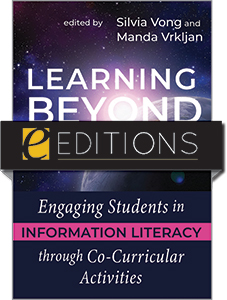
Learning Beyond the Classroom: Engaging Students in Information Literacy through Co-Curricular Activities—eEditions PDF e-book
The download link for this product can be found on the final confirmation screen after you complete your purchase, and may also be accessed from your Account Profile. For more information about ALA eEditions file types and how to view them on eReaders, desktop computers, and other devices, see this page.
Primary tabs
You don't need to be an ALA Member to purchase from the ALA Store, but you'll be asked to create an online account/profile during the checkout to proceed. This Web Account is for both Members and non-Members. Note that your ALA Member discount will be applied at the final step of the checkout process.
If you are Tax-Exempt, please verify that your account is currently set up as exempt before placing your order, as our new fulfillment center will need current documentation. Learn how to verify here.
- Description
- Table of Contents
- About the authors
Co-curricular learning is an approach to teaching experiential learning using activities or programs for students outside of their coursework that include intentional learning and development. Co-curricular learning benefits from having clear learning outcomes as well as helping develop competencies that connect to students’ academic or career goals. It can be a way to engage students in the ACRL Framework for Information Literacy for Higher Education and have them begin to apply its concepts to all areas of their life and studies.
Learning Beyond the Classroom explores activities that can help develop students’ IL knowledge, stimulate them academically and creatively, and help them develop new skills. In four sections—Campus Connections, Employment Experiences, Innovative Initiatives, and Assessment Approaches—chapters illustrate different approaches to incorporating the ACRL Framework concepts and how best to measure a student’s success to demonstrate the value of the co-curricular activities.
A student’s development within their chosen discipline prepares them for a future career, but it is the transferable skills they acquire through experiential activities that demonstrate their full understanding of the concepts taught. Learning Beyond the Classroom can help librarians include information literacy concepts within co-curricular activities and prepare their students to apply critical thinking to everyday pursuits.
Introduction
Silvia Vong and Manda Vrkljan
SECTION I. Campus Connections
Chapter One. Learning, Leading, and Information Literacy
Lisa Janicke Hinchliffe and Beth Hoag
Chapter Two. Issues 360™: A Co-Curricular Approach to Information Literacy, Critical Thinking, and Civil Discourse in the Sciences
Marianne Stowell Bracke
Chapter Three. Taking Flight as a Campus Partner: Library Programs Support a Residential Curriculum
Katy Kelly and Heidi Gauder
Chapter Four. Cycles, Conversations, and Creation: Introducing Research Culture through Research Posters
Silvia Vong and Vincci Lui
SECTION II. Employment Experience
Chapter Five. Library Student Employment and Educational Value Beyond the Paycheck
Elizabeth L. Black
Chapter Six. On-the-Job Information Literacy: A Case Study of Student Employees at Purdue University Archives and Special Collections
Tracy Grimm and Neal Harmeyer
Chapter Seven. The Student Friends of the John M. Kelly Library: Workplace Information Literacy through Philanthropic Activities
Manda Vrkljan
SECTION III. Innovative Initiatives
Chapter Eight. Library Labyrinth: Strategic Exploration in a Library Escape Room
Michelle Ashley Gohr
Chapter Nine. Fostering International Students’ Academic Transformation Using Information Literacy Programming
Karen Pillon and Yayo Umetsubo
Chapter Ten. Zines as Critical Praxis Collapsing Discourse Around Who Owns Knowledge, and What it Means to be an Author
Madeline Veitch and Lydia Willoughby
Chapter Eleven. Teaching Information Literacy with Civic Hacking Activities
Bethany McGowan
Chapter Twelve. Exploring Service-Learning with Dance Students
Lorelei Rutledge and Sarah LeMire
SECTION IV. Assessment Approaches
Chapter Thirteen. Embedding Intentional Reflection Activities to Build Critical-Thinking Skills
Hailley Fargo
Chapter Fourteen. Rethinking Information Literacy Assessment: Relevance, Reliability, and Validity of Constructs and Measures
Melissa Clark
About the Authors
Silvia Vong
Silvia Vong is head of public services at the John M. Kelly Library, University of St. Michael’s College in the University of Toronto. She has a master of library and information science from Western University (London, Ontario) and a master of education from York University (Toronto, Ontario). Currently, Silvia is a doctoral student at the Ontario Institute for Studies in Education of the University of Toronto. Her research interest is focused on critical reflective practice in librarianship and learning. When she’s not fending off germs from her two kiddos, she likes to brainstorm and develop co-curricular learning ideas with Manda Vrkljan in her spare time.
Manda Vrkljan
Manda Vrkljan is the InfoExpress liaison at the John M. Kelly Library, University of St. Michael’s College in the University of Toronto. She has a master of information from the University of Toronto. She developed the Student Friends of the Library as an opportunity for students to establish their own library community centered around their mutual affection for its collections and spaces, and to cultivate future Friends of the Library committee members. Her research interests include organizational development, scholarly communication, and library monetization initiatives. At the end of the day, when she procrastinates commuting home, she pitches student engagement activities to Silvia Vong.


